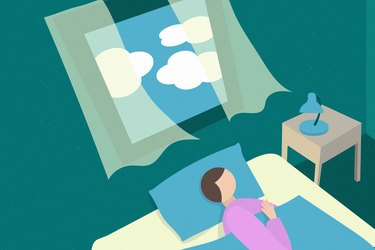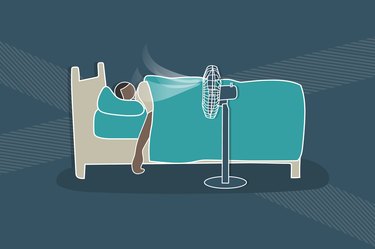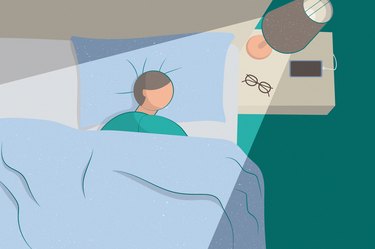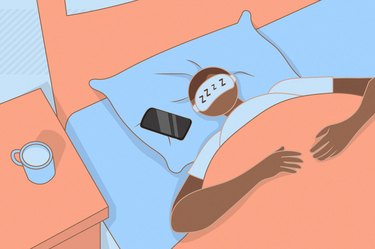
Fresh air, cool breeze, the gentle rustling of leaves. There are lots of things that sound nice about sleeping with the window open.
But in reality, it's not always the best move for a solid night of shut-eye, says Shelby Harris, PsyD, a psychologist specializing in sleep medicine and Director of Sleep Health at Sleepopolis.
Video of the Day
Video of the Day
Here's why it might be bad to sleep with the window open and what to do instead.
4 Risks of Sleeping With the Window Open
So what, exactly, is so bad about opening up your bedroom to the great outdoors? Here's what the experts have to say:
1. You Could Exacerbate Your Allergies
If you have seasonal allergies, leaving the window open while you sleep is a near-guaranteed way to start up your symptoms.
That's because allergens like pollen, mold and ragweed from the outdoors can quickly waft inside, says Zachary Rubin, MD, a board-certified allergist and spokesperson for the American College of Allergy, Asthma and Immunology.
This may leave you waking up with a stuffy nose, itchy nose or eyes or a cough. You may even get dry mouth or a headache in the morning, he adds.
That's why, if you have allergies, "the safest approach is to keep your windows closed while sleeping," he notes.
2. You Could Let In Pollutants if the Air Quality Is Bad
Opening your bedroom window at night might improve your indoor air quality by lowering levels of carbon dioxide or other pollutants, according to a November 2022 study in Building and Environment.
But if the air quality outside isn't great (i.e., there's smog or smoke in the air), you may end up letting more gunk in, Dr. Rubin says. That's especially true if you live in an urban area with lots of traffic, per the National Institute of Environmental Health Sciences.
3. Outside Noises Might Disrupt Your Sleep
When you think of sleeping with the windows open, you might imagine hearing the sounds of crickets or a leave-rustling breeze as you doze off.
But if you live on a busy street or in a populated area, there's a good chance you'll get woken up by passing cars or noisy neighbors, Harris says.
Research backs this up: People reported feeling more tired and had more trouble concentrating on logical thinking tests the day after sleeping with the windows open, even if they felt like their sleep had been fine, according to an October 2016 controlled trial in Indoor Air.
4. Temperature Fluctuations Could Disrupt Your Sleep
Sure, it can be nice to sit outside on a warm summer night. Cooler (but not cold) temperatures actually win out when you're trying to sleep, though, Harris says.
Turns out, the ideal bedroom temperature is between 60 and 67 degrees Fahrenheit, per the Cleveland Clinic.
If it's warmer or colder than that outside (and that air is flooding your sleep space), there's a good chance you'll spend the night tossing and turning.
Still Want to Keep the Window Open? Try These Tips
If you're still set on keeping the windows open when you sleep, you may want to:
- Run a HEPA air filter: A filter can help remove some of the allergens or pollutants that might be floating into your bedroom, so you don't breathe them in. "But it's not a guarantee," Dr. Rubin says. One good pick is the Shark HE402 air purifier ($308.95, Amazon).
- Wear earplugs or use a white noise machine: This will help drown out any outdoor noises that might wake you up, Harris says. One good pick is the Hatch Restore 2 ($199.99, Hatch).
- Try to manage the temperature: Keep some extra blankets handy if you expect your room to get chilly by the middle of the night. Or if it's warm and you don't have air conditioning, consider some of the stay-cool tips below.
How to Sleep Cool When You Don't Have A/C
Turns out, you don't always have to keep the windows open to stay cool without A/C.
Here are a few things you can do to stay cool throughout the night:
- Take a hot shower or bath before bed: Sounds counterintuitive, but spending 10 minutes in hot water one to two hours before bed actually encourages your body to cool off once you step out, which might help you doze off easier, according to an August 2019 analysis in Sleep Medicine Reviews.
- Use a cooling mattress topper: A cooling topper can help regulate your body heat, helping you maintain a comfortable sleep temperature throughout the night, Harris says. The most effective options are made from materials like latex, wool or down, but memory foam toppers with cooling gel might also do the trick.
- Use cooling sheets: Like a cooling topper, the right sheets will feel cool to the touch and won't trap excess body heat, Harris says. Options made from linen or bamboo tend to work best.
- Run a fan: Fans don't actually lower the temperature in your room. But they can increase airflow so you feel cooler, Harris says. The Honeywell QuietSet Whole Room Tower Fan ($55.99, Amazon) is powerful but quiet, so it won't keep you up.
So, How Bad Is It Really to Sleep With the Windows Open?
Keeping the windows open or shut while you sleep is ultimately a matter of personal preference.
But if you're a light sleeper, are sensitive to temperature changes or have seasonal allergies or concerns about air quality, it may be worth keeping the outdoor air outside.
- Indoor Air: "The effects of bedroom air quality on sleep and next-day performance"
- Building and Environment: "A field intervention study of the effects of window and door opening on bedroom IAQ, sleep quality, and next-day cognitive performance"
- National Institute of Environmental Health Sciences: "Air Pollution and Your Health"
- Cleveland Clinic: "What's The Best Temperature For Sleep?"
- Sleep Medicine Reviews: "Before-bedtime passive body heating by warm shower or bath to improve sleep: A systematic review and meta-analysis"
- drshelbyharris.com: "Shelby Harris, PsyD"
- Oakbrook Allergists: "Zachary Rubin, MD"
Is this an emergency? If you are experiencing serious medical symptoms, please see the National Library of Medicine’s list of signs you need emergency medical attention or call 911.







